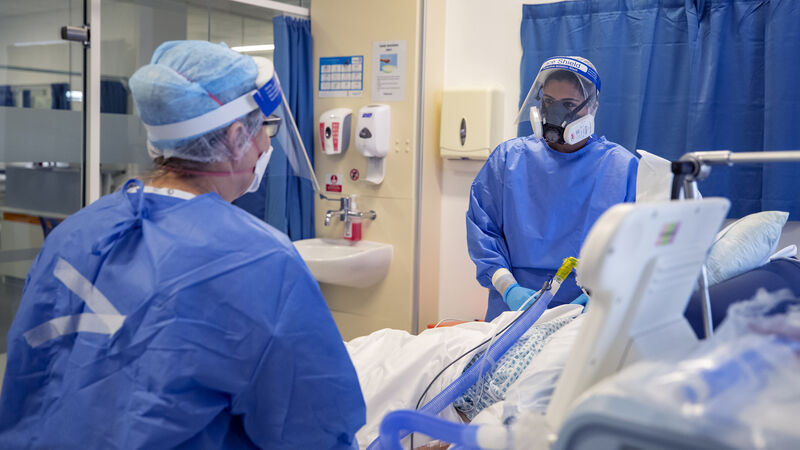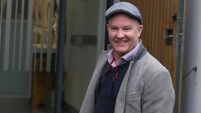Covid patients 'experience PTSD-like flashbacks after ICU treatment'

Ireland has 286 ICU beds, with a coronavirus surge capacity of up to about 350 to serve a population of more than 4.9m, leaving health experts worried.
PTSD-like flashbacks have been suffered by some Covid-19 patients following treatment in intensive care units, medics have confirmed.
But recovery from the virus in ICU is now between 80%-83% in Ireland - significantly higher than our UK neighbours, a consultant in intensive care medicine said.
Previously healthy patients being admitted to ICU due to Covid-19 in their 50s and 60s are already requiring “a huge amount of oxygen” to breathe and may soon require ventilation in ICU, Dr Cliona Ní Cheallaigh, Infectious Diseases and Internal Medicine physician at St James’ Hospital in Dublin, said.
And as pressure on hospitals rises with the pandemic, doctors may be forced to chose who to admit to ICU and who to leave without that medical intervention, she said.
Ireland has 286 ICU beds, with a Covid surge capacity of up to about 350 to serve a population of more than 4.9m, leaving Dr Ní Cheallaigh and her colleagues worried about the coming weeks.
“There’s at least a week’s lag time between people getting Covid and their sickest point, so we’re very worried about what the next few weeks are going to bring,” Dr Ní Cheallaigh told RTÉ.
And older people, or those with very poor health, may not be considered for ICU at all. “You wouldn’t be sending in someone who is elderly, frail, who won’t be able to cope and come out the other side,” she said.
Being in intensive care can be a traumatic experience for people, she said, with Covid patients often heavily sedated and intubated — where a tube is put down your throat and into your lungs which is attached to a machine that pumps air into and out of your lungs.
“And people often have flashbacks, similar to PTSD, similar to what people would get from wars, from being in ICU, from being on these machines. It’s a very invasive situation to be in.
"You can’t talk, you can’t move, there are lights on, there’s noise.”
But Dr Enda O’Connor, Consultant in Intensive Care Medicine and Director of Intensive Care Services at St James’s Hospital, said that while there can be a psychological cost for some patients from being in ICU, the vast majority of patients there survive thanks to medical interventions.
Good explanation of ICU care here from John 🥰 https://t.co/lZ8dDu53Sa
— Cliona Ni Cheallaigh (@ClionaNi) January 8, 2021
Between 80%-83% of all Covid patients admitted to ICU will survive while the discharge rate from ICUs nationwide including all conditions is close to 90%, he said.
“Our data in Ireland compares very favourably with countries around the world, particularly in contrast to places like the US and the UK,” Dr O’Connor said.
“The death rate in the UK is closer to 40% whereas we’re about 17%-20%.” But a Covid patient will typically take 17 days to recover - that’s 10 days more than an average ICU admission.
“The average stay in our intensive care unit before the pandemic came along was about seven days. The average stay of a Covid patient that comes into the intensive care ward is 17 days. That has a knock-on effect.
“The most effective way we have of putting a stop to this really very worrying rise of Covid cases is to keep away from other people.
****Outpatient Services Curtailed ****
— St James's Hospital (@stjamesdublin) January 4, 2021
Due to the rising numbers of COVID-19 infection rates in the community, some outpatient services have been postponed.
All patients will be contacted in due course regarding the rescheduling of their appointment. pic.twitter.com/NIzS3w9dXn
“And also to roll out an effective and widespread vaccination programme.” More than 100 patients are currently critically ill with Covid-19 with more than 1,000 people in hospital with the virus.
“A huge amount” of planned surgeries are now being cancelled as the hospitals swell with Covid patients who may require the ventilators also needed for post-operative patients.
Staff numbers are also dwindling as medics are diverted to Covid wards or are off sick having contracted the virus or been in close contact with someone who tested Covid-positive.
“We’re talking about highly needed surgeries — knee and hip surgeries for people who are immobile with pain, valve surgeries, cancer surgeries,” Dr Ni Cheallaigh said.
“We haven’t had to cancel urgent cancer surgeries, yet.”





